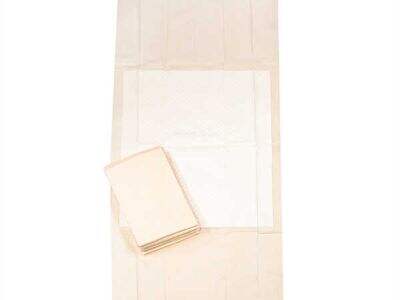Els coixinets del llit són una opció fantàstica per mantenir a algú còmode i net al llit. Els coixinets del llit proporcionen una absorció addicional en cas de vessaments o accidents per garantir que la persona es mantingui seca i còmoda. Però n'hi ha tants per triar, pot ser aclaparador esbrinar quin tipus de coixí de llit és el millor per a tu. Aquest article exposa els avantatges i els contres dels dos tipus de coixins de llit. Discutirem per què els coixinets de llit estàndard segueixen sent tan crítics, quin és més barat, trencarem els coixinets del llit en el nostre entorn i compararem la quantitat de líquid que contenen tots dos. Tant de bo, al final, haureu fet una feina millor que jo per esbrinar quin coixí de llit serà el més adequat per a vosaltres.
Coixinets de llit: el bo i el dolent | Materials d'infermeria
Els coixinets de llit d'un sol ús s'utilitzen habitualment en llocs com hospitals i centres assistencials. La causa òbvia per la qual els agrada molt als éssers humans és que són molt nets per funcionar. Aquests coixinets van ser dissenyats per a un sol ús. Els descarteu un cop s'hagin utilitzat. Vol dir que no s'ha de netejar desordenadament o que no s'han de rentar després, això és molt útil per a llocs ocupats on el temps importa. No ocupen gaire espai, ja que vénen en paquets compactes i nets, de manera que és fàcil treure el que necessiteu.
Dit això, hi ha desavantatges als coixinets de llit d'un sol ús. Una de les principals preocupacions és que poden ser costosos, sobretot si en feu servir molts de manera regular a la vostra instal·lació. Si depèns millors coixinets de llit d'un sol ús, els costos es poden disparar amb el temps. A més, els coixinets d'un sol ús són un malbaratament i dolents per al nostre planeta. Aquests coixinets solen estar fets de plàstic i altres materials sintètics que no es descomponen fàcilment i poden trigar anys a descompondre's als abocadors. Un altre problema és que algunes marques de coixinets d'un sol ús poden ser menys absorbents que altres. Això pot crear fuites i provocar molèsties per a la persona que les porta". A més, solen ser massa calents o incòmodes per a alguns usuaris perquè estan fets amb plàstic i no són realment suaus i transpirables per a aquells amb pell sensible.
La importància dels bons coixinets de llit vells
Ara, anem a cobrir els coixinets de llit tradicionals. Els coixinets de llit convencionals són de polièster o altres jerseis d'origen natural. A diferència dels coixinets d'un sol ús, aquests es poden rentar i reutilitzar repetidament. Tot i que requereixen una mica més de temps i treballen per netejar-los quan s'acaben, són l'opció més econòmica per a les zones que hauran de fer-ne un ús freqüent. L'ús d'alternatives ecològiques com aquests coixinets costa poc amb el temps, ja que només els renteu i reutilitzeu en comptes de llençar-los cada mes com ho faria amb un coixinet tradicional.
Una altra cosa fantàstica dels coixinets de llit tradicionals és que solen ser molt més còmodes per a l'usuari. Aquests estan fets de materials transpirables amb circulació d'aire que faran que la persona que els faci servir sigui fresc i còmode. Això és molt útil per a aquells amb pell sensible, ja que els coixinets tradicionals són menys propensos a irritar. I com que estan fets de materials naturals, els coixinets tradicionals també són més ecològics que els d'un sol ús. Produeixen menys escombraries i es poden reutilitzar moltes vegades. Finalment, els coixinets de llit tradicionals solen ser més absorbents que coixinets d'un sol ús sota el llit. És a dir, poden contenir més líquid abans d'arribar a la saturació, evitant que l'usuari es torni humit i es senti incòmode durant períodes de temps més llargs.
Quin coixí de llit costa menys?
De fet, quan s'intenta determinar quin coixí de llit és el menys car, varia completament en funció de les necessitats individuals. Si no necessiteu utilitzar coixinets de llit amb tanta freqüència o treballeu en una instal·lació de pressupost ajustat, els coixinets d'un sol ús poden ser l'opció més pràctica. Bé, només la gent els fa servir de vegades. Tanmateix, si ho feu servir coixí de llit impermeable regularment, probablement estalviareu diners a la llarga utilitzant coixinets de llit tradicionals que es poden rentar i reutilitzar. No haver de seguir comprant coixinets d'un sol ús nous una i altra vegada. A més, com hem comentat anteriorment, els coixinets de llit tradicionals solen absorbir més líquid que els coixinets d'un sol ús. Això pot significar que hi ha una necessitat reduïda de coixinets tradicionals per cobrir la mateixa quantitat de sòl, la qual cosa també condueix a escenaris d'estalvi de costos.
Com afecten el medi ambient els coixinets de llit d'un sol ús?
Gran part del món dels coixinets d'un sol ús es redueix als seus efectes sobre el nostre planeta, un dels seus principals desavantatges. Generen molts residus perquè estan dissenyats per a un sol ús i després es descarten. Aquests residus poden trigar de diverses dècades a anys a assentar-se als abocadors i també poden danyar el nostre medi ambient. Els coixinets d'un sol ús també es fabriquen amb petroli i altres recursos no renovables. Això significa que la seva producció pot tenir un efecte negatiu sobre el medi ambient. En canvi, els clàssics coixinets de llit estan fets de material natural, i com que els pots reutilitzar moltes vegades, són una alternativa encara més ecològica. L'ús de coixinets comuns redueix els residus i redueix l'impacte en el medi ambient.
Capacitat d'absorció de líquids, en comparació amb el coixinet de llit d'un sol ús i normal
Finalment, aquí teniu un desglossament de la quantitat de líquid que pot contenir cada tipus de coixinet. Els coixinets d'un sol ús i tradicionals tenen com a objectiu protegir la persona que els porta de fuites i accidents. Però els coixinets d'un sol ús solen tenir un nivell d'absorció més baix que els coixinets tradicionals, però no sempre és així. Això vol dir que tenen una major capacitat de líquid abans que es saturin. Això significa que un coixí de llit tradicional pot proporcionar una experiència més agradable per a l'usuari, assegurant-se que es mantingui sec i menys preocupat per les fuites.
En resum, triar entre coixinets de llit d'un sol ús i reutilitzables té molt a tenir en compte. Els coixinets de llit d'un sol ús poden ser còmodes, fàcils d'utilitzar i al vostre carrer; tanmateix, poden arribar a ser cares i poden tenir conseqüències desastroses per al medi ambient. Alternativament, els coixinets de llit normals poden ser més fàcils de netejar i més cars en general, però en general són molt més còmodes i absorbents. ANPA subministra la gamma completa de coixinets de llit tradicionals -204s en 4 opcions de color. És per això que triar el coixí de llit adequat significa que podeu garantir la comoditat i la cura dels que més ho necessiten.

 EN
EN
 AR
AR
 BG
BG
 HR
HR
 DA
DA
 NL
NL
 FI
FI
 FR
FR
 DE
DE
 EL
EL
 HI
HI
 IT
IT
 JA
JA
 KO
KO
 NO
NO
 PL
PL
 PT
PT
 RO
RO
 RU
RU
 ES
ES
 SV
SV
 CA
CA
 TL
TL
 IW
IW
 ID
ID
 LV
LV
 LT
LT
 SR
SR
 SK
SK
 VI
VI
 HU
HU
 MT
MT
 TH
TH
 FA
FA
 AF
AF
 GA
GA
 HY
HY
 AZ
AZ
 KA
KA
